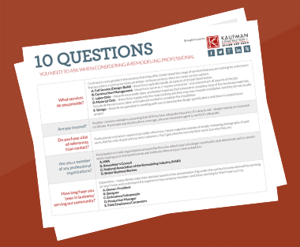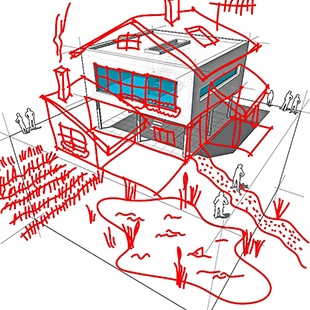Planning a new home or a remodeling project can be overwhelming. Of course, your first step in the process to find the right professional for the job. Not all are created equal - they vary widely in experience, availability, and the services they offer. When you start interviewing potential candidates, there are some key questions you need to ask that can save you stress, time and, ultimately, money. Here are 10:

1. What services do you provide?
Before your project begins, you need to understand the range of services you are looking for and ensure that you select a contractor that can deliver on those services. Some service options include:
Full Service
Construction Management
Labor Only
Material Only
Design
2. Are you insured?
Another common mistake is assuming that all firms have adequate insurance. It's okay request an insurance certificate. If you have any doubt about coverage, ask your insurance agent to verify if it's adequate.
3. Do you have a list of references I can contact?
Professional contractors expect to provide references. Never the mistake of simply reviewing photographs of past work. Ask for a list of past and current customers - you'll get a feel for not only their work, but who they are.
4. Are you a member of any professional organizations?
Participation in trade organizations ensures the firm you select is part of a larger community of professionals and is committed to staying up on the latest trends and methods. Here are just a few to look for:
Home Builders Association (HBA)
Remodeler's Council
National Association of the Remodeling Industry (NARI)
Better Business Bureau
5. How long have you been in business/serving our community?
Many clients make their decision based on the presentation. Dig under the surface to know who will be working on your home and understand the experience key company members and those working for them have. Find out about the:
Owner/President
Designer
Estimators/Salespeople
Production Manager
Field Employees/Carpenters
6. What type of contract do you provide?
Feeling comfortable with the contractor is one of the most important parts of a construction relationship, but agreements should be based not on a handshake but clear written commitment. Make sure to understand what type of agreement the contractor is presenting:
Estimate
The probable cost for the project is presented as a total cost, but the final bill will be based on actual costs
Cost Plus
There may or may not be an estimate but final price will be based on actual costs plus a percentage for management fees. Sometimes labor/material invoices are disclosed, sometimes not
Construction Budget
Estimates are included for all expected costs, but final price will be based on the final cost of each item
Fixed Price
All subcontracts are finalized and a final price is presented, which will not change unless there are unforeseen circumstances or you make change during construction
7. Do you offer a construction schedule?
Knowing what to expect as well as when and where you can direct questions and accountability is important. Critical items include:
Written Work Schedule
Understand the format the construction schedule will be presented in. For example: a Gantt chart, a calendar of events, or verbally
Delay Notification
Determine if your agreement includes a commitment for timely communication of delays
Accountability
Understand what constitutes a reasonable delay and what the ramification is
Point of Contact
Be sure to know to whom to direct questions or concerns and their availability
8. What are the lines of communication for each phase of your project?
Homeowners have expectations that are often not met. Make sure you know the point of contact and the expected duration for each critical phase of the job and have an understanding of how often and by which means you will communicate.
Design
Pricing
Production
Job Warranty
9. What are your cleaning policies?
It's your home. Make sure that you understand and can live with the firm's cleaning policies.
Daily
Weekly
Monthly
End of Project
10. How much of the job will be subcontracted to other contractors and how will these vendors be managed?
Some aspects of your job will be subcontracted to other firms. This can positively impact the quality and efficiency of your project - unless trade contractors are not managed effectively.
Scope
Understand what aspects of your job will be subcontracted
Management
Determine how subcontracts are managed and the accountability that the firm you hire has for cost and time commitments. For example, who absorbs cost overruns?
Access
Understand how and when subcontractors will be in your house and how you will be notified








